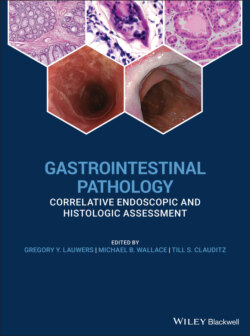Читать книгу Gastrointestinal Pathology - Группа авторов - Страница 56
Gastroesophageal Reflux Disease Definition, General Features, Predisposing Factors
ОглавлениеThe chronic regurgitation of gastroduodenal juice into the esophagus causes gastroesophageal reflux disease (GERD). The mucosal injury results from the effects of refluxed gastric acid, bile, pepsin, and duodenal contents that overwhelm the normal protective antireflux barriers, such as esophageal acid clearance and mucosal resistance. Risk factors and predisposing conditions include obesity, diet, sedentary lifestyle, tobacco and alcohol use, hiatus hernia, reduced lower esophageal sphincter tone, loss of esophageal peristaltic function, gastric hypersecretory states, and delayed gastric emptying. Symptomatic GERD is prevalent worldwide, with considerable geographic variation. Prevalence estimates are approximately 20% in North America and Europe, with only East Asia showing estimates <10%.
